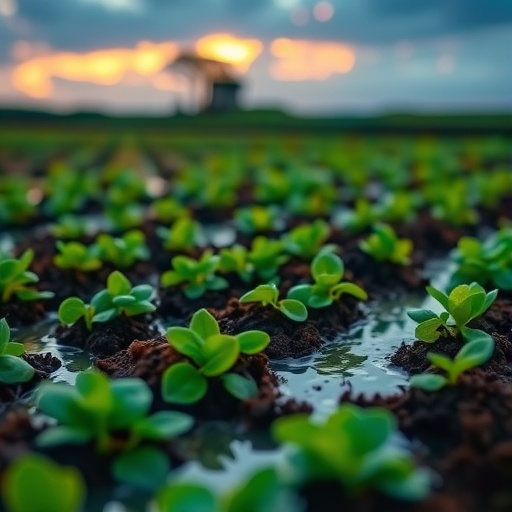Ananya Das and Kshiti Kangovi, rising stars from Texas A&M University’s multidisciplinary engineering technology (MXET) program, have set their sights on addressing a critical challenge that affects millions worldwide: water scarcity and inequity in agriculture. Their pioneering solution harnesses the power of artificial intelligence integrated with cutting-edge soil sensor technology, crop-specific data, and predictive weather forecasting. This innovative irrigation management system is designed to precisely instruct farmers on when and how much to water, promising an unprecedented leap in agricultural water efficiency.
This breakthrough concept did not go unnoticed. Das and Kangovi’s proposal, a culmination of their expertise and dedication, was awarded the top prize of $100,000 at Texas A&M’s highly competitive “Building a Better Future Through Business and AI” contest. The competition attracted 103 proposals from innovative minds across 37 universities, underscoring the rigorous scrutiny and competitive environment their project triumphed over.
The uniqueness and impact of their venture, named SomaTech, lies in its holistic approach to a persistent global problem. Unlike existing solutions that often fall short in drought-stricken regions, SomaTech’s system combines AI-driven irrigation algorithms with biodegradable polymer technology. These polymers expand within the soil matrix to retain water, functioning as a natural reservoir that mitigates evaporation and runoff, especially vital in arid and drought-prone environments.
By integrating these water-retentive polymers, the soil effectively acts as a sponge, releasing moisture gradually and directly to crop roots. This not only conserves precious water resources but also enhances crop yields by maintaining optimal hydration levels, which traditional irrigation systems struggle to achieve due to inefficiencies and environmental losses. This synergy promises a scalable, cost-effective alternative that can potentially transform agricultural practices in vulnerable communities across the globe.
Das emphasizes the societal ramifications of their system, stating that smarter irrigation transcends individual farms, holding the potential to rejuvenate entire regions challenged by water scarcity. The project research illuminated a significant service gap; drought-prone zones historically remain neglected by tailored solutions able to counteract unique water management challenges posed by climate variability and soil degradation.
Both students are on specialized academic tracks focusing on mechatronics within the MXET program and are pursuing minors in embedded systems. Their academic curriculum has provided them with invaluable hands-on experience in sensor deployment, real-time data processing, and system integration, all essential technical pillars supporting their innovative irrigation solution. This multidisciplinary expertise enabled them to conceptualize and engineer a system that is not just theoretical but highly practical and field-ready.
Texas A&M professor Dr. Gaurav Pandey, an associate professor in the MXET program, provided critical mentorship to Das and Kangovi, guiding their project’s refinement each week. His support was pivotal in fortifying the system’s technical framework, encompassing sensor calibration, AI model accuracy, and user interface design to ensure usability for farmers with varying degrees of technology familiarity.
The MXET department, alongside faculty and graduate assistants, played a significant role in nurturing their project’s maturation. Input from diverse academic perspectives helped shape SomaTech’s conceptual framework and practical implementation strategies. This collaborative academic environment exemplifies Texas A&M’s commitment to cultivating innovation with real-world impact.
Further bolstering their journey, Das and Kangovi benefitted from experts at the Meloy Engineering and Innovation Program. Mentors Jim Donnell, Chris Curran, and Chris Westfall provided entrepreneurial insights and practical advice, facilitating their navigation through the intersection of technology development and business viability—crucial for transitioning their concept into a market-ready solution.
The $100,000 award also includes a valuable year-long mentorship with a seasoned venture capitalist. This engagement is poised to accelerate SomaTech’s evolution from prototype to pilot testing in real agricultural settings. It also opens pathways for partnerships aimed at scaling the technology’s deployment in regions suffering from acute water shortages, thereby amplifying its ecological and economic benefits.
SomaTech’s integration of AI with biodegradable polymer technology represents a transformative nexus of agricultural engineering and environmental sustainability. This approach underscores a critical paradigm shift: leveraging advanced materials and intelligent analytics to create resilient, adaptive solutions capable of mitigating climate-driven resource challenges.
Ananya Das and Kshiti Kangovi’s innovative irrigation management system exemplifies the future of precision agriculture—a future where technology, sustainability, and social equity converge. As they continue to refine and validate their system, the potential to alleviate water scarcity impacts on millions of farmers and entire ecosystems draws closer to realization.
With their project, these ambitious students not only demonstrate technical brilliance but also embody a profound commitment to solving one of humanity’s pressing environmental challenges. The adventure of SomaTech is just beginning, and its ripple effects may redefine agricultural water management on a global scale.
Subject of Research: Artificial intelligence-driven irrigation management incorporating soil sensor technology and biodegradable water-retentive polymers for sustainable agriculture.
Article Title: Texas A&M Students Develop AI-Enhanced Irrigation System to Combat Global Water Scarcity in Agriculture
News Publication Date: Not specified
Web References:
https://mediasvc.eurekalert.org/Api/v1/Multimedia/c21ef50b-5724-49b4-b038-eeb42b399fe1/Rendition/low-res/Content/Public
Image Credits: Texas A&M University
Keywords: Artificial intelligence, Agriculture, Agricultural engineering, Polymer chemistry, Materials, Chemical compounds, Polymers, Biodegradability, Natural resources management, Sustainability, Water management, Water conservation, Mechatronics
Tags: addressing water scarcity in agricultureagricultural water conservation techniquesAI in agriculturebiodegradable polymer technology in farmingcrop-specific irrigation strategiesirrigation efficiency solutionsmultidisciplinary engineering solutionspredictive weather forecasting in farmingsoil sensor innovationsustainable agriculture practicesTexas A&M University innovationwater management technology





